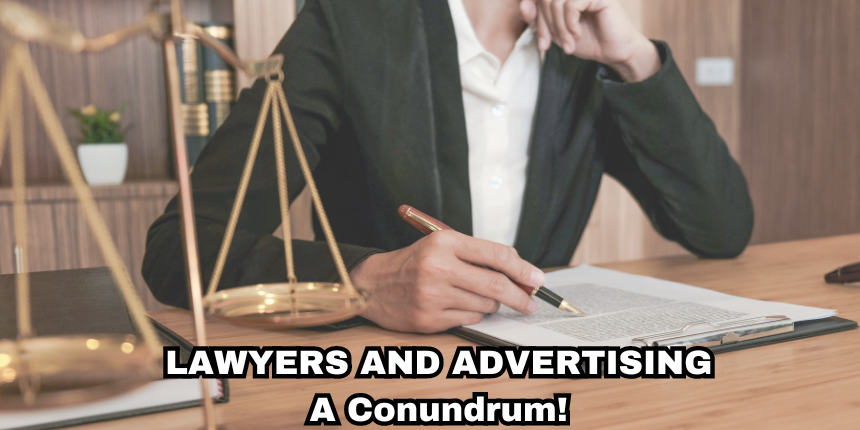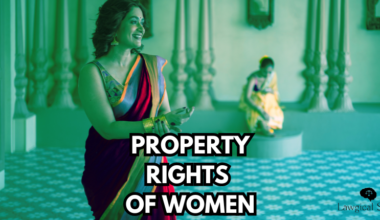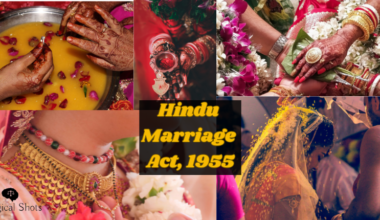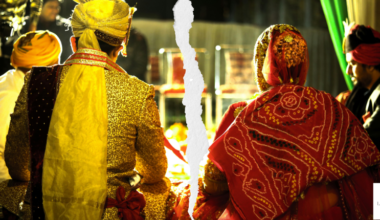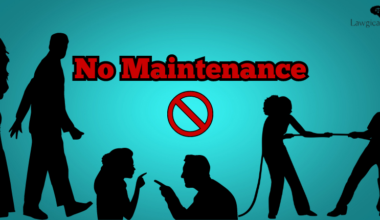Have you ever contacted a lawyer through an online platform. Have you come across those huge hoardings while crossing the Court buildings? While these things are more common these days, the conundrum surrounding lawyers and advertising still remains. But hey, Do you know Why Lawyers are not allowed to advertise? The recent Madras High Court Judgment on Advocates Rules explains the reasoning and the law on why advocates cannot advertise in the wake of upholding Justice. To get a hang of it, we will first go through the legislation governing the conduct of Advocates, elaborating Rules and the recent verdict by Madras High Court which has reignited the debate around the initial question.
Why Lawyers are not allowed to advertise? – Let’s Find Out
Section 35 of Advocates Act, 1961
Section 35 of the Advocates Act lays the punishment of advocates for misconduct. It provides the procedure to be followed on receipt of complaint or in case of State Bar Council having reason to believe an advocate being guilty of professional or other misconduct, matters to be dealt with by the disciplinary committee. Section 35 of Advocates Act provides for dismissal of complaint, reprimanding the advocate, suspension from practice, or removal of the Advocate from the State roll.
Rule 36 of Bar Council of India Rules
Section 36 of the Standards of Professional Conduct and Etiquette to be Observed by Advocates particularly restricts solicitation or advertising by advocates. The provision reads as –
“36. An Advocate shall not solicit work or advertise, either directly or indirectly, whether by circulars. Advertisements, touts, personal communica-tions, interview not warranted by personal relations, furnishing or inspiring newspaper comments or procuring his photograph to be published in connection with cases in which he has been engaged or concerned. His sign-board or name-plate should be of a reasonable size. The sign-board or name-plate or stationery should not indicate that he is or has been President or Members of a Bar Council or of any Association or that he has been associated with any person or organisation or with any particular cause or matter or that he specialises in any particular type of work or that he has been a Judge or an Advocate-General.”
The question of Why Lawyers are not allowed to advertise?, and the provision behind it has been discussed in detail by the Madras High Court in a recent verdict which directed the Bar Council of India to take appropriate action against the lawyers soliciting/advertising their works through online platforms.
Also read – Supreme Court discusses time limit for filing writ petition in High Court
Madras High Court Judgment on Advocates Rules
A writ petition was filed before the High Court (PN Vignesh v. Bar Council of India) seeking directions for Bar Council of India and Tamil Nadu to take appropriate actions against platforms like Quikr, Sulekha and Just Dial and any other service provider, restraining them from carrying on the business of providing legal services on their web portal and applications. While dealing with the same, the Court addressed the question of why Lawyers are not allowed to advertise.
While delineating the legal profession in India from the rest of the world, the Court said that “Unlike a few other countries, Indian legal profession is unique as we represent selfless courage by spearheading some of the rights based movements in our country. Our Indian freedom movement comprising of some of the best lawyers in the country stands testament to the same. Every lawyer in our country is a contributor in the process of delivery of justice. And it is not for any third party to brand or rate the services of a lawyer. Legal profession is not and can never be treated as a business.”
The Court regarded the ‘branding culture’ in the legal profession as detrimental to society. The Bench expressed that “ranking or providing customer ratings to lawyers is unheard of and demeans the ethos of the profession. Professional dignity and integrity must never be compromised especially in the legal profession.”
Legal Service v. Business
While explaining the difference between lawyers and businessmen, and unlike businesses, why Lawyers are not allowed to advertise, the Court explained that legal service is neither a job nor a business. Since business is purely driven by profit motive, but the larger part in law is a service to the society, although availed after payment of a service fee to the lawyer, but paid out of respect for their time and knowledge.
The Court reasoned for the tag of noble profession for advocacy accompanying a sense of dignity and strong principles of ethics. It enunciated the duty of lawyers towards the client as well as Court, whose edifices are structured by the Constitution of India which is the grundnorm from which various other laws emanate. Lawyers play a crucial role in Justice delivery process. Who play the bridge connecting the Judicial chair with the litigants approaching the Courts. The Court expressed that “The fundamental duty of a lawyer is to uphold the law whilst fighting for his client’s rights. It is not just about securing a favourable order for the client but more about fighting for Justice. This is the predominant reason as to why the legal profession stands apart in both spirit and character from the rest. The object of any business is profit but the sole object of the Legal profession is Justice. Truth and Justice can never be traded. And lawyers being important elements in this fight for Truth and Justice can never be equated with businessmen or traders.”
The Court particularly picked upon the instances of self-branding of lawyers, promotional advertisements, customer ratings to lawyers and unverified claims of expertise in specific areas of law, enlisting lawyer names on business websites and providing offer price for legal consultations.
Also read – Supreme Court Judgments on Amendment of Pleadings
Madras High Court clarified that “online intermediaries engaged in the act of providing a platform for lawyers to publish their information to connect with litigants and the public and to solicit work from them is clearly against principles of professional conduct as mentioned under BCI Rules.”
Reprimanding the online intermediaries, the Court commented that “The style of functioning and the mode contemplated under these online websites are self evident that they are promoting and soliciting work for both the lawyers and litigants by getting commissions.”
Therefore, the Madras High Court directed the Bar Council of India to initiate disciplinary action against the lawyers directly or indirectly soliciting works. It further directed the intermediaries to remove such content in violation of BCI Rules.
Do you have any personal opinions on why lawyers are not allowed to advertise, or the Madras High Court Verdict on Advocates Rules, share with us at LinkedIn !!
